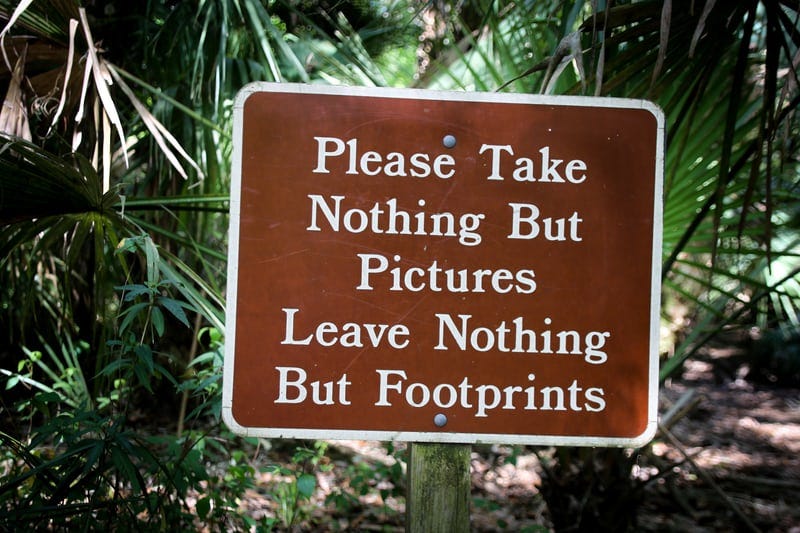Fighting climate change, eradicating hunger, demolishing poverty, and breaking the gender, pay, racial, wealth, you name it gaps won’t get resolved overnight, let alone in a lifetime.
Many investors are in a toss-up. Dependent on your generation, you either love or hate value minded funds. Traditional investing seems to only focus on generating the biggest and baddest returns, not solving humanitarian problems outside of one’s portfolio. How selfish. On one end, you want to maximize your return in any possible way to fund your lifestyle but on the flip side, you realize mining more bitcoin, oil, ordering GrubHub, and killing wildlife will make the only planet we live on worse off.
Why do investors have to get into this sticky situation between profit or return?
Well it’s time that fund managers and companies tackle climate change because who else will? There is no other sector that takes up a larger percentage of GDP than the financial sector. Banks have the most power to enact real change with hefty balance sheets, cash, and influence but are only willing to dig into it once they need to and that time is now.
Unfortunately, most people change when they are forced to, not when they need to. That was a lesson millions learned in March 2020. Now their savings are slowly fading.
We are self-centered as investors and companies are in it to maximize profits for shareholders. We can’t blame them. That’s how they work and are in existence as a public company. But as we were sheltered at home, reduced our traveling, commuting, raised awareness around political and environmental issues, we also took inventory of our life span and how we want our world to shape out down the road.
Climate change and promoting ESG through investing is the most efficient way to gauge investor interest, otherwise volunteering or donations won’t cut it inside the portfolio.

Practice What You Preach
The most pressing issues this generation is eager to tackle are racial equity and climate change. These are pertinent topics that must be resolved and I’m proud of my generation for stepping up since billion-dollar industries won’t get around to it as fast as we can in part due to production and switching costs. Who knows how much change Greta is really leading but that’s besides the point.
We are the future and next generation of investors. We should be focused on having our money work for us and for the world. At least some of us believe so.
Although my generation, GenZers are advocates for helping the environment and serving those besides themselves, their portfolio’s actions and investment goals don’t resemble it all that much.
Investing in Environmentally, Sustainable, Corporate Governance is no easy feat and not all that appealing to investors especially those who decide to park their money for decades in a diversified index fund that tracks a broader index. Investing in ESG a lot of the time can entail specific stocks and some investors aren’t interested. The ideal demographic to fit day and swing trading is my generation yet ESG isn’t gambling. It is long-term investing.
The GenZers that are investors, which is less than half are far more interested in speculative assets from meme stocks to crypto. They don’t bother to work with a financial advisor, in part due to the high expense ratios that don’t pay for themselves with limited funds and a majority of teens have a negative net-worth of -$50k. But on their own terms, whether they are invented in retail trading apps, a great deal of them are day traders, taking big bets on single stocks that are bound to a) not make any difference to the environment with constantly buying and selling since it isn’t a long-term approach or b) loose money and turn into a gambling addiction.
Practicing what we preach isn’t all that common, especially in politics and with the environment. Efforts around greenwashing seem evident in the investment world as well so it can be difficult to block out the noise and lofty marketing in this sector. Ultimately, ESG is still a pretty low-value add payout. It is made to be long-term as this is a longer term issue. If you’re looking to gain exposure into alternatives, help the environment, and actually grow your money, individual ESG names may be a better fit, if you are willing to stomach the volatility.

Incentive
In order to do anything, we need an incentive. The number #1 reason people invest is to not be a slave to their time. They want to earn passive income so they don’t have to sacrifice their manual labor for every dollar they earn. As Buffett states, otherwise you will work until you die. No one wants to live that way and thanks to the market, with less than a dollar, you can take part in free commission trading and fractional shares.
It is the only way to truly become financially free and secure, not reliant on a pay ceiling or Uncle Sam.
In the market, gains are unlimited but also your losses. Risk whatever you’re willing to loose because investing in the market is as dangerous as not investing.
Play your cards right, expect uncertainty, volatility, and ride it out for the long-term, the main strategy fund managers need to get on board with to attract clients to these new asset classes.
In order for companies to not burn the planet, they need to have an incentive through a competition of some sorts on ESG rating. If a company can get their carbon emissions down to a certain level, they will have a higher ESG rating to brag about, possible promotion from the SEC and or FINRA on the exchanges, and their valuation and press would be unparalleled.

To Be or Not To Be
There is certainly a trade off between profit and sustainability. ESG is a low-value add field because investors’ money cannot build more trees, add diversity into a company, promote plant-based burgers instead of meat, and advocate for public transportation in a few weeks.
With companies signing off on the Climate Pledge, pleading to be net zero carbon by 2040, this is a lofty audacious goal that many investors are scratching their heads on. Although they would much rather see higher returns any day, maybe this is a pledge they can buy into. Amazon, the largest retailer in the U.S. pledges they can fulfill this goal and state they are half-way there. Whether or not you believe in them, maybe this is your chance before every player steps up and joins to get in on the ESG craze. It could be as hot as the retail trading mania. Who knows!
Investing in ESG isn’t all about investing in companies we haven’t heard of either. With Oatley and Sweetgreen’s public debut this past year, they have a promise to fulfill in eating and drinking sustainably. Although these companies aren’t in the $1 trillion dollar exclusive club as Amazon is, these under appreciated new names may be making bigger strides than the e-commerce giant polluting the planet in a few years. One of the greatest things about the markets is that it is unpredictable and is trading in today’s price for the future. The future is made here and ESG has to be a part of it whether we like it or not.
I’ll leave you with this.
Everything worthwhile takes time, especially with investment gains and the earth. Two painfully slow processes.
You can go ahead and compare ESG funds to broader indexes. Majority of them will be lower at this point in time. They aren’t new, they are just not established enough and haven’t caught on yet. Jump on the train before it gets crowded. We need to save the planet whether we like it or not. I believe our portfolios and bank accounts will thank us in a few decades.

